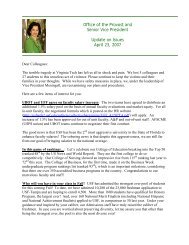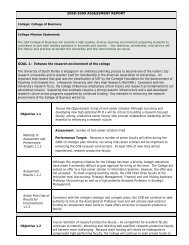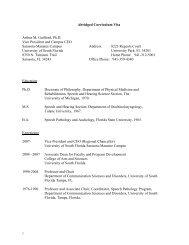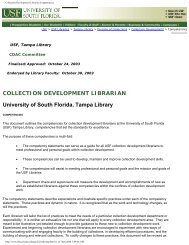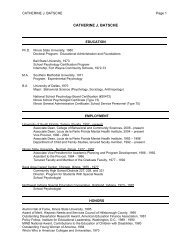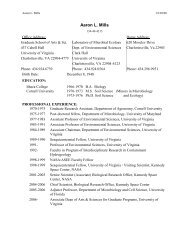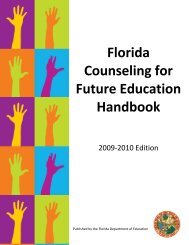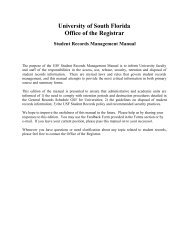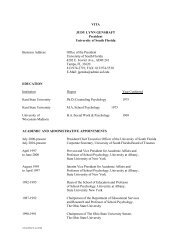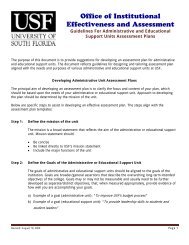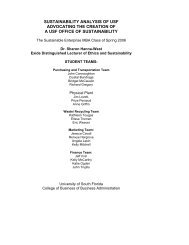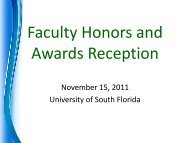Integrating Service-learning into an Urban Anthropology Course ...
Integrating Service-learning into an Urban Anthropology Course ...
Integrating Service-learning into an Urban Anthropology Course ...
Create successful ePaper yourself
Turn your PDF publications into a flip-book with our unique Google optimized e-Paper software.
L<strong>an</strong>ce Arney, M.A.Ph.D. C<strong>an</strong>didate <strong>an</strong>d InstructorDepartment of <strong>Anthropology</strong>University of South FloridaE-mail: larney@mail.usf.edu<strong>Integrating</strong> <strong>Service</strong>-<strong>learning</strong><strong>into</strong> <strong>an</strong> Urb<strong>an</strong> <strong>Anthropology</strong><strong>Course</strong> Syllabus (ANT 4442: Urb<strong>an</strong> Life <strong>an</strong>d Culture)Presented at the University of South Florida Day Institute on Engaged Scholarship <strong>an</strong>d Community Redevelopment,October 30, 2009. Sponsored by Florida Campus Compact <strong>an</strong>d the USF Office of Community Engagement.
Presentation Outline: Excerpts taken fromANT 4442 service-<strong>learning</strong> syllabus• <strong>Course</strong> Description <strong>an</strong>d Purpose• <strong>Course</strong> Goals, Objectives, <strong>an</strong>d Expectations• Grading Distribution• Ethnographic Readings Blogs• <strong>Service</strong>-<strong>learning</strong>• Community Partners, Community Engagement,<strong>an</strong>d Community Based Research• Fieldwork Journal Blogs (Notes <strong>an</strong>d Reflections)• Deliverable to Community Partner• <strong>Course</strong> Reflections Final Essay
<strong>Course</strong> Description <strong>an</strong>d PurposeThis course will survey recent ethnographic research on the topicsmost relev<strong>an</strong>t to underst<strong>an</strong>ding urb<strong>an</strong> life <strong>an</strong>d culture in theneoliberal <strong>an</strong>d globalizing world of today:• rural to urb<strong>an</strong> migration <strong>an</strong>d socio-political marginalization;• gentrification, housing, <strong>an</strong>d neoliberal urb<strong>an</strong> development;• immigr<strong>an</strong>t labor, urb<strong>an</strong> poverty, <strong>an</strong>d tr<strong>an</strong>snational spaces;• indigenous people, citizenship, <strong>an</strong>d urb<strong>an</strong> org<strong>an</strong>izing;• architecture, urb<strong>an</strong> design, <strong>an</strong>d everyday socio-cultural life;• urb<strong>an</strong> spatialization of heritage <strong>an</strong>d memory;• ethnohistorical approaches to urb<strong>an</strong> ethnic relations;• blackness, whiteness, <strong>an</strong>d class stratification in urb<strong>an</strong> contexts;• the politics <strong>an</strong>d cultures of public spaces;• children <strong>an</strong>d youth living in a street situation;• fear <strong>an</strong>d security, urb<strong>an</strong> crime, <strong>an</strong>d class segregation;• environmental racism <strong>an</strong>d urb<strong>an</strong> activism;• media technologies <strong>an</strong>d urb<strong>an</strong> life.
<strong>Course</strong> Description <strong>an</strong>d Purpose,cont’d• As a service-<strong>learning</strong> course, students will be required to workwith a nonprofit org<strong>an</strong>ization in the Tampa Bay area.• <strong>Service</strong>-<strong>learning</strong> is a philosophy of education that asserts thatstudents c<strong>an</strong> achieve course <strong>learning</strong> goals <strong>an</strong>d retain coursecontent in more profound <strong>an</strong>d lasting ways through experiential<strong>learning</strong> in a real world context.• <strong>Service</strong>-<strong>learning</strong> typically takes place in the context ofcommunity development work or a social ch<strong>an</strong>ge project.• <strong>Service</strong>-<strong>learning</strong> benefits the community <strong>an</strong>d is directly linked tocourse curriculum, content, <strong>an</strong>d goals, <strong>an</strong>d it entails ongoing selfreflectionexercises through which studentsreflect on the social context of the <strong>learning</strong> process,<strong>an</strong>alyze their own relationships to other people <strong>an</strong>d the world,challenge their own assumptions about social problems <strong>an</strong>d issues,<strong>an</strong>d cultivate a more committed sense of civic responsibility <strong>an</strong>d ethicalsense of personal agency.
<strong>Course</strong> Goals, Objectives, <strong>an</strong>dExpectations• This course emphasizes critical thinking <strong>an</strong>dinquiry.• In keeping with the <strong>learning</strong> objectives of theFoundations of Knowledge <strong>an</strong>d Learning CoreCurriculum at USF, this course emphasizesinquiry as the me<strong>an</strong>s of developing complexintellectual skills that enable students to become critical thinkers, concerned citizens,successful professionals, <strong>an</strong>d reflective people whothroughout their lives are aware of, underst<strong>an</strong>d, <strong>an</strong>dengage with the complexities <strong>an</strong>d challenges that ourglobal realities require.
<strong>Course</strong> Goals, Objectives, <strong>an</strong>dExpectations, cont’dStudents who successfully complete all courserequirements will:• gain a solid underst<strong>an</strong>ding of the basic concepts, issues, <strong>an</strong>dperspectives of urb<strong>an</strong> <strong>an</strong>thropology;• develop a general underst<strong>an</strong>ding of <strong>an</strong>thropological theories <strong>an</strong>dmethods of producing knowledge;• become familiar with outst<strong>an</strong>ding examples of recent ethnographies ofurb<strong>an</strong> life <strong>an</strong>d culture written by <strong>an</strong>thropologists;• learn what <strong>an</strong>thropologists c<strong>an</strong> contribute to the study of urb<strong>an</strong>ization,urb<strong>an</strong>ism, urb<strong>an</strong> life <strong>an</strong>d culture by conducting ethnographic fieldresearch in the context of a service-<strong>learning</strong> project with a localnonprofit org<strong>an</strong>ization concerned with urb<strong>an</strong> issues; <strong>an</strong>d• learn how to use <strong>an</strong>thropological approaches, theories, concepts, <strong>an</strong>dresearch methods to describe, explain, <strong>an</strong>d propose recommendationsfor solving urb<strong>an</strong> problems.
Grading Distribution150 points Attend<strong>an</strong>ce <strong>an</strong>d Participation = 10% of final grade300 points Ethnographic Readings Blogs = 20% of final grade150 points <strong>Service</strong>-<strong>learning</strong> Hours = 10% of final grade450 points Fieldwork Journal Blogs = 30% of final grade225 points Deliverable to Community Partner = 15% of final grade75 points In-class Final Presentation = 5% of final grade150 points <strong>Course</strong> Reflections Final Essay = 10% of final grade1500 points Total = 100%
<strong>Course</strong> schedule
Ethnographic Readings Blogs• In order to prepare for class discussions on Mondays, you will submit a 250-word paragraph of written text prior to each Monday class meeting.• These paragraphs will be submitted via Blackboard as blog entries <strong>an</strong>d willbe based on the ethnographic readings, which are selections from booklengthurb<strong>an</strong> ethnographies <strong>an</strong>d are intended to offer a comparative, crossculturalperspective from which to view aspects of urb<strong>an</strong> life <strong>an</strong>d issuesacross the globe.• More detailed instructions about the ethnographic readings blogs c<strong>an</strong> befound on the Blackboard course site.• Each student will submit 6 ethnographic readings blogs. Each blog is worth50 points for a total of 300 points (or 20% of your final grade). There are 12ethnographic readings in total.• Students will be divided <strong>into</strong> two groups at the beginning of the semester.The two groups will alternate each week in submitting blog entries so thatevery student in both groups does a total of 6 blogs, one every other week.All students in both groups will be equally responsible for participating inseminar-style discussions about the readings during Monday classes.
<strong>Service</strong>-<strong>learning</strong>• This course requires that you spend some time outside of classconducting urb<strong>an</strong> ethnographic field research in the context ofservice-<strong>learning</strong> with a locally operating nonprofit org<strong>an</strong>izationconcerned with some issue regarding urb<strong>an</strong> life <strong>an</strong>d culture.• This c<strong>an</strong> be done with <strong>an</strong> org<strong>an</strong>ization near the USF campus or inthe Tampa Bay area, although students will be encouraged towork with <strong>an</strong> org<strong>an</strong>ization in the Sulphur Springs neighborhood,which is about a fifteen minute drive from the USF campus.• There are 15 service-<strong>learning</strong> hours required. You will do service<strong>learning</strong>at least one hour a week beginning with the week ofJ<strong>an</strong>uary 25 <strong>an</strong>d ending with the week of April 19th; during threeof these weeks you will need to do service-<strong>learning</strong> at least twohours in order to accumulate all 15 hours.• <strong>Service</strong>-<strong>learning</strong> hours d will be logged in Blackboard on a weeklybasis. Each hour is worth 10 points for a total of 150 points (or10% of your final grade).
Community Partners, Community Engagement,<strong>an</strong>d Community Based Research• You will be strongly encouraged, though not required, to do service-<strong>learning</strong> inSulphur Springs, a neighborhood close to the USF campus <strong>an</strong>d in which theInstructor <strong>an</strong>d his faculty mentor Dr. Sus<strong>an</strong> Greenbaum have been conductingresearch <strong>an</strong>d other projects for a number of years (Dr. Greenbaum since 1999,the Instructor since 2007).• Other USF faculty <strong>an</strong>d students have also been conducting research, offeringservice-<strong>learning</strong> courses, operating nonprofit org<strong>an</strong>izations, <strong>an</strong>d directing oradvising various kinds of community based projects in Sulphur Springs.• This involvement includes Dr. Antoinette Jackson (<strong>Anthropology</strong>), Robin Jones(Geography), <strong>an</strong>d others, who have developed community engaged partnershipswith a variety of institutions, org<strong>an</strong>izations, <strong>an</strong>d agencies in Sulphur Springs overthe years.• The long-term community engagement of these faculty have created ongoingcommunity based research projects in which students c<strong>an</strong> easily participate in amore structured, coherent way <strong>an</strong>d with stronger implications for social action.• A descriptive inventory of institutions, org<strong>an</strong>izations, <strong>an</strong>d agencies operating inSulphur Springs will be provided at the beginning of the semester.
Fieldwork Journal Blogs (Notes<strong>an</strong>d Reflections)• The purpose of the fieldwork journal blogs are for you todemonstrate how specific topics, issues, <strong>an</strong>d aspects ofurb<strong>an</strong> life <strong>an</strong>d culture that you learn about through service<strong>learning</strong>c<strong>an</strong> be understood <strong>an</strong>thropologically by applyingsome of the relev<strong>an</strong>t <strong>an</strong>thropological knowledge,perspectives, theories, <strong>an</strong>d methods you learn aboutthrough the course content <strong>an</strong>d readings.• For the fieldwork journal blogs, you will(1) record descriptive observations about the social,org<strong>an</strong>izational, <strong>an</strong>d urb<strong>an</strong> contexts in which you do your service<strong>learning</strong><strong>an</strong>d research,(2) write critical reflections about what you learn through openendedconversational interviews <strong>an</strong>d focused observations, <strong>an</strong>d(3) <strong>an</strong>alyze the connections between what you learned duringyour fieldwork activities <strong>an</strong>d the weekly topics <strong>an</strong>d assignedreadings.
Deliverable to Community Partner• At the conclusion of your community based research project,which will be conducted at your service-<strong>learning</strong> site, yourcommunity partner will be expecting you to deliver a finalproduct (or “deliverable”).• By the third or fourth week of your service-<strong>learning</strong>, you shouldnegotiate with your community partners about what yourdeliverable to them will be.• Agree to a deliverable that is realistic <strong>an</strong>d actually doable within athree month time sp<strong>an</strong>. Do not be overly ambitious <strong>an</strong>d do notpromise to “save the world.” If you work as a student group, youought to be able to offer more th<strong>an</strong> if you were working as <strong>an</strong>individual.• Your deliverable may take a number of different forms orformats, <strong>an</strong>d it may include <strong>an</strong> action pl<strong>an</strong> or require that yourcommunity partners or future volunteers continue some aspectsof the project beyond the end of the semester. The Instructor willprovide guid<strong>an</strong>ce about community partner deliverablesthroughout the semester.
<strong>Course</strong> Reflections Final Essay• The final exam for this course is a self-reflection essay (4-5double-spaced pages or 1000-1250 words).• The objectives of the final reflective essay are for you to review,summarize, <strong>an</strong>d reflect on what you have learned about urb<strong>an</strong>applied <strong>an</strong>thropology during the course of the semester by doingservice-<strong>learning</strong> based field research.• The final essay is therefore part course summary <strong>an</strong>d part criticalreflection, <strong>an</strong>d its purpose is twofold:(1) it allows you to demonstrate that you comprehend the “big picture”regarding <strong>an</strong>thropological approaches to underst<strong>an</strong>ding the diversity ofurb<strong>an</strong> life <strong>an</strong>d culture, <strong>an</strong>d(2) it allows you to demonstrate that you c<strong>an</strong> critically reflect on thesignific<strong>an</strong>ce of the contexts <strong>an</strong>d processes involved in your ownexperiential <strong>learning</strong>.• The course reflections final essay should include a short synopsisof the research findings from your service-<strong>learning</strong> fieldworkproject <strong>an</strong>d explain how what you learned through this coursehelped you to arrive at those results.
Other Resources Online• USF Syllabus Checklist (from the Center for21st Century Teaching Excellence)http://www.c21te.usf.edu/resources/syllabuschecklist.pdf



